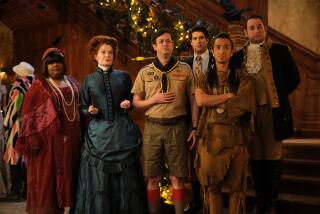‘Ghosts’ Reflects Noble Crusade
- Share via
I write with concern about a common thrust of Kenneth Turan’s review of Rob Reiner’s “Ghosts of Mississippi” (Calendar, Dec. 20) and Sean Mitchell’s article (Sunday Calendar, Dec. 15).
The common complaint of the two pieces is that, in Turan’s words, “Ghosts” is “another movie in the ‘Mississippi Burning’ tradition that focuses on a heroic white person getting his eyes opened about the nature of his own and society’s racism.”
I believe that “Ghosts” fully reflects the noble crusade of Myrlie Evers in demanding that the state of Mississippi finally bring her husband’s killer to justice. It reflects the nobility, dedication and self-sacrifice of Medgar Evers and others in the perilous near-past to lead African Americans those first steps toward the freedom and equality our Constitution promises.
However, it serves no purpose to demand that Hollywood ignore that there were many white Americans who tried to assist in that dangerous journey.
Mitchell says that Reiner’s film “paints only part of the picture” in choosing to focus on the story of the white assistant district attorney in Jackson, Miss., Bobby DeLaughter, who “went the final mile” to win a conviction against Medgar Evers’ killer, Byron De La Beckwith.
That reads like legitimate drama to me, and I know it to be legitimate history. Why do we have to erase the contributions of sympathetic whites in order to acknowledge the glorious accomplishments of brave blacks in this imperative struggle?
There is a distressing and even dangerous regression to racism on both sides of the color line these days. To ignore that we have come this short but significant distance together (at least to some extent) is to jeopardize the cooperation and trust we need on both sides to complete the journey.
Yes, it is discouraging that the story of Evers, his brave life and tragic death and enduring legacy, has not been told as the subject of its own film. That notwithstanding, it would appear that Turan’s opinion (“even if the facts skew toward accurate, the nuances in ‘Ghosts of Mississippi’ are all wrong”) is founded in some personal argument that facts should be used to make a different film, one whose “nuances” agree with his vision. To accuse Hollywood--and, by implication, “Ghosts”--of not telling the truth or “anything close to it” is a distortion of the facts. And to review the film you wanted it to be instead of the film that was made is to miss the point.
I was privileged, both as an actor and as someone concerned with these issues, to portray equal rights activist Morris Dees in “Ghosts of Mississippi.” Dees, I believe, bears out my contention that there have been white hands as well as black on the oars. As the head of the Southern Poverty Law Center and as the head of Klan Watch in the South even back into the dark times of Jim Crow, Dees endangered his own life in dedicating it to an achievement of equality.
Indeed, his own offices were bombed, as one might expect of a man “watching” the klan in the period of its virulent control of a part of our country. He has brought successful lawsuits against hate groups in the South. And, yes, he truly did assist Mrs. Evers in bringing the prosecution of De La Beckwith once more before the judgment of his peers.
By the way, there were two hung juries in the murder trial of De La Beckwith in the ‘60s. In other words, in a time when vengeful anti-black hatreds held sway, four white Southern males in one trial and five in another had the courage to find a klan icon guilty of the murder of a black man.
Of course, the march to racial equality was led primarily by blacks, but why obliterate the history of the whites who encouraged and even joined in the trek? The view of the filmmakers that your writers seem to have missed is not the celebration of Medgar Evers’ life and the idealization of him after his death but that in spite of the horrible injustices inflicted on blacks by a white-dominated community, progress has been made.
White people who had not been willing previously to stand against the tide were doing so and, in this case, had prevailed. That was the point of the film.
More to Read
Only good movies
Get the Indie Focus newsletter, Mark Olsen's weekly guide to the world of cinema.
You may occasionally receive promotional content from the Los Angeles Times.










